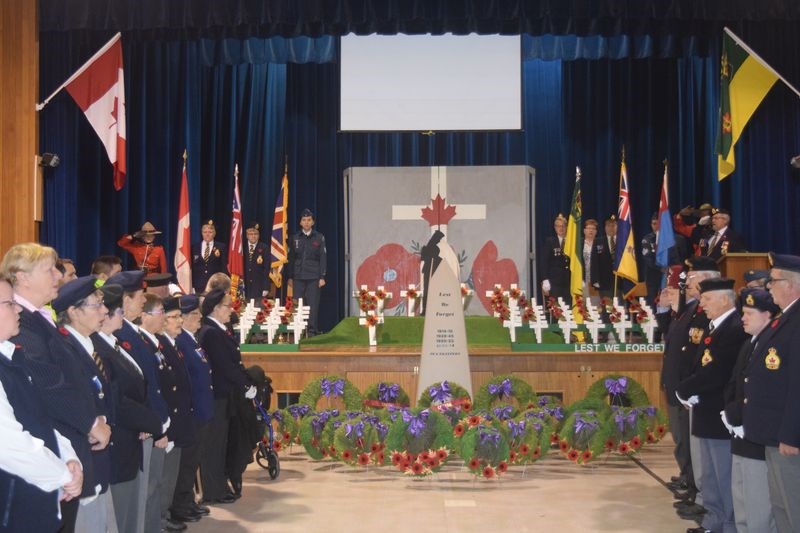One of the best lessons of history is that great results often follow from seemingly small events, Rev. Stephen Ruten said in his homily during the Remembrance Day service held at the Victoria School on November 11.
The battle in Quebec on the Plains of Abraham in 1759 is said to have been one of Canada’s five greatest battles although by today’s standards that battle would seem small, Ruten said, reminding the audience of the explosive power of nuclear bombs.
Over a million citizens contributed to the country’s war effort during the Second World War which was about 40 per cent of the male population between the ages of 18 to 45 in addition to more than 25,000 women, he said. “We know that on D-Day 150,000 Allied soldiers landed in France, including 14,000 Canadians.
“The fight that took place on the Plains of Abraham seems like pretty small stuff when we set it alongside that more recent battle beginning on D-Day,” he said, offering the example of King Alexander of Greece who had been bitten by a monkey before dying of sepsis which opened the way for King Constantine to return to Greece and led the country to a losing war with Turkey that resulted in 250,000 Greek deaths.
“A quarter of a million persons died of that monkey’s bite,” Ruten said, quoting Winston Churchill. “An animal bite seems like an insignificant thing, but what a chain of events it can unleash.”
A battle that was decided in 15 minutes, with just over 8,000 British soldiers against a much larger French force may seem insignificant, but in those few minutes on the Plains of Abraham, historian Jack Granatstein says this was ‘the key battle’ to determine that Canada would be a British colony, he said. Canada’s future was with the English, not the French, and it was determined in a few minutes of battle, with a few thousand soldiers on either side.
“We honour every soldier that contributed 250 years ago to what Canada has become,” he said. “Today we honour everyone who has sacrificed his or her life and shed his or her blood in the intervening wars and we give special honour to every one whose name was called today. We remember them.
“We value highly political freedom in our country,” he said. “It is a blood-stained freedom we enjoy because many have done battle and died to guard it. A wary, suspicious eye is cast on those who appear to threaten it.
“Today we remember those who, by their sacrifice, made Canada the land of the free, our true north strong and free,” Ruten said. “And we remember Jesus, who sacrificed His blood for sins and who alone can set people free in this far greater battle.”
In addition to Ruten, presiding at the Remembrance Day service were: Jim Woodward, president of the Kamsack branch of the Royal Canadian Legion; Ray Muir, parade marshall and sergeant-at-arms; Karen Bodnaryk, commanding officer of the Kamsack air cadets; Darren Kitsch, bandmaster; Marilyn Marsh with the Kamsack Community Choir; Kyler Kitsch, bugler, and Keri Lindsay, the piper.
Playing the bagpipes, Lindsay led the colour party into the hall and after O Canada, Woodward read the Honour Roll of district residents who had lost their lives in the two World Wars, the Korean War and during peacetime service. Kyler Kitsch played The Last Post and Reveille.
Prior to the beginning of the program, Woodward explained the significance of the 90 white crosses, each decorated with a poppy, that were displayed on the stage.
“These represent the 90 years the Legion has served in our community,” Woodward said, explaining that the Legion is a non-profit organization tending to the needs of veterans and their families. “Next year, we will celebrate our country’s 150th with as many white crosses for Canada’s remarkable history.”
Woodward said that in the community there still lives three veterans of the Second World War but the persons in uniform, both military and RCMP, attending the service “are new veterans each willing to serve our country so that we can enjoy our freedoms.”
Ruten said the opening prayer, and then the choir led everyone in the singing of Nearer My God to Thee.
Wreaths were laid on behalf of: the governments of Canada and Saskatchewan, the RCMP, Town of Kamsack, the fallen of Afghanistan, peacetime veterans, the Kamsack Hospital and Nursing Home, Eaglestone Lodge, Duck Mountain Ambulance Care, Kamsack fire fighters, Good Spirit School Division, Kamsack Comprehensive Institute, Victoria School, youth of Canada, Chief Gabriel Cote Education Centre; Keeseekoose First Nation, all chiefs education, Cote First Nation, Royal Purple Elks, third and fourth degree of the Knights of Columbus, King Solomon Masonic Lodge, Parkland Shrine Club, Royal Canadian Air Cadets, Mrs. Gladys Bishop Smith, Walter Cazakowski, St. Josaphat’s Ukrainian Catholic Church, Kamsack museum, the Woodward families, James (Jack and Lawrence) Rudd, Roy Falkiner, Duncan McLean, War Amps Canada Operation Legacy, CUPE 4980, Ritchie Industries, Yorkton Co-op food store, Andrychuk Funeral Home, Wolkowski Funeal Service, Walter N. Rezansoff, the Eastern Star, George Njegovon and Claude Hollett, Robert Lucier and the Kamsack branch of the Royal Canadian Legion.
The KCI band played the Hymn of Remembrance and then the choir sang One Wish and Rev. Nancy Brunt read the scripture.
After Ruten delivered his homily, the choir sang On Flanders Fields and Ruten delivered a closing prayer. The service concluded with the singing of God Save the Queen.
Members of the Kamsack Legion drove to Togo for a service at 2 p.m. in front of the community’s cenotaph.



